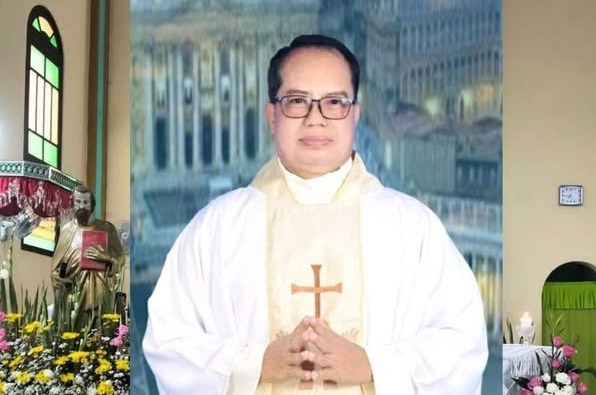
Bishop Peter Tin Wai: Myanmar Civilians Struggle to Survive
As Myanmar’s civil war grinds on, the cries of ordinary people are being drowned out by the roar of bombs and gunfire. Yet, in the heart of Rakhine State, a spiritual leader is raising his voice for those who cannot. Bishop Peter Tin Wai of Pyay has spoken out about the immense suffering civilians are facing—men, women, and especially the youth—who are “just trying to survive” amid relentless violence, forced enlistment, and daily uncertainty.
A Nation in Turmoil
Myanmar has endured cycles of conflict for decades, but since the military seized power in February 2021, the scale of violence has deepened into one of the most devastating civil wars in Southeast Asia. Rakhine State, historically a land of rich cultural heritage and painful political tension, is now a frontline of conflict between the Myanmar military (Tatmadaw) and the Arakan Army (AA), an ethnic armed group that has rapidly expanded its territorial control.
The Arakan Army, which claims to fight for greater autonomy and rights for the Rakhine people, has managed to capture 14 out of 17 municipalities in the state. In response, the military, losing ground, has escalated its campaign with airstrikes, artillery shelling, and raids that frequently hit civilian areas.
Tragedy in Kyauktaw: Children Among the Dead
One of the most harrowing episodes occurred on 12 September, when the Burmese army carried out an airstrike in Kyauktaw, a town in northern Rakhine. Two private schools were struck, killing at least 20 young people aged between 15 and 21. The attack not only robbed families of their children but also shattered what little sense of normalcy remained in a war-torn community. Schools—symbols of hope and progress—were turned into graveyards overnight.
The Bishop of Pyay, whose diocese covers nearly the whole of Rakhine State, pointed to this tragedy as a grim reminder that the brunt of war is being borne by the innocent. “In many areas, communication is cut off, the education system is in crisis, and people are just trying to survive,” he told the Vatican news agency Fides.
A Diocese Under Fire
Despite the escalating crisis, the Catholic community under Bishop Tin Wai’s care continues to practice its faith. The Pyay Diocese, home to roughly 30,000 faithful, is organized into twelve parishes. Priests remain alongside their congregations, offering spiritual and material support where they can, keeping churches open, and administering sacraments amid fear and scarcity.
But their mission is not easy. About half of the diocese’s members live in AA-controlled areas, while the rest remain in Sittwe, Kyaukpyu, and Munaung—towns still under direct military control. This division creates immense logistical and safety challenges for church leaders trying to provide care equally across communities. Movement is risky, supplies are limited, and families live in constant fear of being caught in the crossfire.
Displacement and Shortages
Like many other conflict zones in Myanmar, Rakhine State is seeing waves of displacement. Families flee their villages to seek refuge in larger towns such as Pyay, or attempt to move farther afield to Yangon, where the fighting is less intense. Refugees often arrive with little more than the clothes on their backs.
Food shortages make survival even harder. The price of rice, a staple of the Myanmar diet, has soared, while access to healthcare and education has collapsed in many areas. Parents desperately search for places where their children can continue schooling, but in war zones, even education becomes a dangerous gamble.
As Bishop Tin Wai noted, “Families try to move to areas where essential services like schools still function.” But such areas are shrinking rapidly, and displacement itself often creates new hardships—overcrowded camps, lack of sanitation, and exposure to disease.
Youth on the Run
Perhaps the most heartbreaking aspect of the conflict is the plight of Myanmar’s young people. Both the Tatmadaw and the Arakan Army have imposed forms of conscription, forcing youth into military service. For teenagers and young adults, the choice is stark: fight in a war they do not believe in, or flee and risk everything to start anew in foreign lands.
“All our youth are fleeing abroad, and society is losing its best energy,” the Bishop lamented. His words echo a painful reality: Myanmar’s brightest future—the creativity, resilience, and hope of its younger generation—is being drained away by war. Those who manage to escape may become part of the ever-growing diaspora, but many are left stateless, jobless, and traumatized.
Faith as Refuge
In times of chaos, the church in Myanmar has often served as both a sanctuary and a source of solidarity. Bishop Tin Wai emphasized that priests and lay leaders are doing their best to remain close to the people, offering not only religious services but also community support. In villages where schools are closed and markets destroyed, the church sometimes becomes the only stable institution left standing.
Still, the clergy face the same risks as everyone else. Churches have not been immune to raids and shelling. Yet, their presence among the suffering is a powerful statement of resilience—a refusal to abandon their flock even when the world around them crumbles.
Rakhine in the Wider Conflict
While Bishop Tin Wai focuses on his diocese, Rakhine State is part of a much broader national crisis. Across Myanmar, ethnic armed groups, People’s Defense Forces, and the military are locked in a struggle that has killed thousands and displaced millions since 2021. The conflict has fractured the country into zones of control, with many areas operating almost independently of central authority.
International condemnation of the military’s tactics has been strong, but aid delivery remains limited due to blockades, insecurity, and restrictions. Humanitarian groups warn that Myanmar risks becoming one of the world’s worst humanitarian disasters if the fighting continues unchecked.
The Human Cost
At the center of this storm are civilians who never chose this war. Farmers cannot safely tend their fields. Traders cannot move goods without being extorted or attacked. Parents must decide whether to risk their children’s lives by sending them to school or keep them home in fear. Entire communities live in limbo, waiting for the next explosion or military raid.
The Bishop’s words, “People are just trying to survive,” capture both the despair and the quiet strength of Myanmar’s civilians. Survival itself has become an act of resistance against forces that seem intent on breaking their spirit.
Looking Ahead
Despite the darkness, Bishop Tin Wai’s testimony is also a call to the international community and to people of faith worldwide. His account reminds us that behind every headline of airstrikes and territorial battles are human lives—families, children, and communities trying to endure.
Ending the war in Myanmar will require more than ceasefires and negotiations. It will require a deep reckoning with decades of injustice, ethnic discrimination, and political exclusion. It will also require the voices of leaders like Bishop Tin Wai—voices that remind the world of the dignity of every human being, regardless of which side controls their land.
Conclusion
The civil war in Myanmar has turned daily life into a struggle for survival, especially in Rakhine State. Airstrikes on schools, forced conscription of youth, mass displacement, and food shortages are tearing communities apart. Yet, amid this devastation, Bishop Peter Tin Wai stands as a witness, raising his voice for those silenced by fear and violence.
His message is clear: civilians are not combatants; they are human beings deserving of peace, dignity, and the chance to live without terror. For now, they endure. But whether Myanmar’s future will belong to its people—or to endless cycles of war—remains uncertain.
Credit: Vaticannews
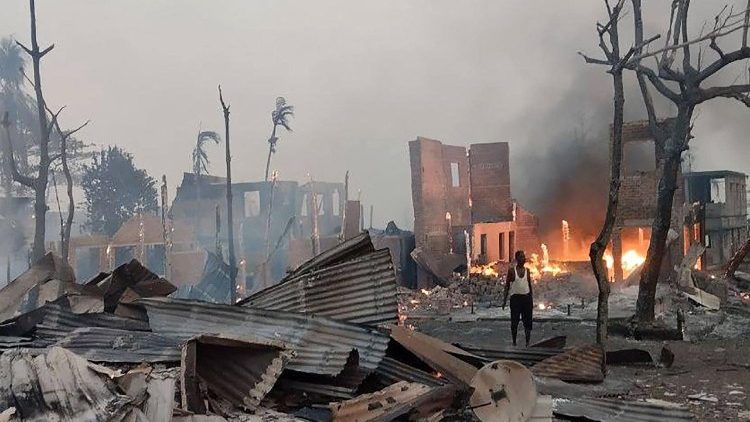
Related posts:
 Policy Dilemmas and Stability: Bangladesh’s Approach to the Arakan Army
Policy Dilemmas and Stability: Bangladesh’s Approach to the Arakan Army
 𝗜𝗻𝗱𝗶𝗮 𝘁𝗼 𝗕𝘂𝗶𝗹𝗱 𝟱𝟬𝟬 𝗸𝗺 𝗼𝗳 𝗡𝗲𝘄 𝗥𝗮𝗶𝗹 𝗟𝗶𝗻𝗲𝘀 𝗡𝗲𝗮𝗿 𝗕𝗼𝗿𝗱𝗲𝗿𝘀 𝗪𝗶𝘁𝗵 𝗖𝗵𝗶𝗻𝗮, 𝗠𝘆𝗮𝗻𝗺𝗮𝗿, 𝗮𝗻𝗱 𝗕𝗵𝘂𝘁𝗮𝗻
𝗜𝗻𝗱𝗶𝗮 𝘁𝗼 𝗕𝘂𝗶𝗹𝗱 𝟱𝟬𝟬 𝗸𝗺 𝗼𝗳 𝗡𝗲𝘄 𝗥𝗮𝗶𝗹 𝗟𝗶𝗻𝗲𝘀 𝗡𝗲𝗮𝗿 𝗕𝗼𝗿𝗱𝗲𝗿𝘀 𝗪𝗶𝘁𝗵 𝗖𝗵𝗶𝗻𝗮, 𝗠𝘆𝗮𝗻𝗺𝗮𝗿, 𝗮𝗻𝗱 𝗕𝗵𝘂𝘁𝗮𝗻
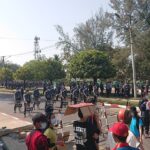 RIGHTS GROUPS DEMAND MYANMAR JUNTA END CHILD SOLDIER PRACTICE
RIGHTS GROUPS DEMAND MYANMAR JUNTA END CHILD SOLDIER PRACTICE
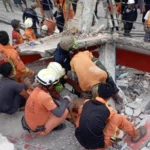 MYANMAR SURVEYS QUAKE DAMAGE, TO AID 39,603 AFFECTED HOMES
MYANMAR SURVEYS QUAKE DAMAGE, TO AID 39,603 AFFECTED HOMES
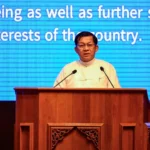 Myanmar Junta Admits Polls Can’t Cover Entire Country
Myanmar Junta Admits Polls Can’t Cover Entire Country
 China Issues Wanted Notices for 100 Myanmar Scam Suspects
China Issues Wanted Notices for 100 Myanmar Scam Suspects
